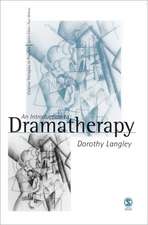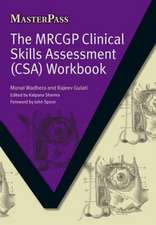Pathology and the Postmodern: Mental Illness as Discourse and Experience: Inquiries in Social Construction series
Editat de Dwight Feeen Limba Engleză Paperback – 19 dec 1999
`A beautifully crafted manuscript which re-invigorates the rather stale debate between the traditionalists and the anti-psychiatry schools of thought.... For all those working in mental health arenas the journeying through this text will be highly rewarding indeed. Stick with it.' - Mental Health Care
`This is a book which will apeal to those interested in theoretical debates rather than to practitioners who may find it heavey weather if they have not had the time or resources to engage with what are often quite difficult and often dense writings' - British Journal of Social Work
`This book.. present[s] a clarity that is vivid.... This book would be a good place for psychiatrists to start' - British Journal of Psychiatry
Pathology and the Postmodern explores the relationship between mental distress and social constructionism using new work from eminent scholars in the fields of sociology, psychology and philosophy.
The authors address: how specific cultural, economic and historical forces converge in contemporary psychiatry and psychology; how new syndromes, subjectivities and identities are being constructed and deconstructed in technological, culturally mediated and hyper-reflexive contexts; and what new critiques of positivism and new understandings of `pathology' seem viable, given these still emerging scenarios.
Building upon work in such areas as labelling theory, feminist studies, linguistics, and post-structuralism, the twelve chapters engage the cultural, historical and political conditions that should be implicated in our understanding of contemporary mental suffering.
Preț: 552.68 lei
Preț vechi: 581.76 lei
-5% Nou
Puncte Express: 829
Preț estimativ în valută:
105.76€ • 115.34$ • 89.17£
105.76€ • 115.34$ • 89.17£
Carte tipărită la comandă
Livrare economică 24 aprilie-08 mai
Preluare comenzi: 021 569.72.76
Specificații
ISBN-13: 9780761952534
ISBN-10: 0761952535
Pagini: 288
Ilustrații: black & white illustrations
Dimensiuni: 156 x 234 x 15 mm
Greutate: 0.44 kg
Ediția:New.
Editura: SAGE Publications
Colecția Sage Publications Ltd
Seria Inquiries in Social Construction series
Locul publicării:London, United Kingdom
ISBN-10: 0761952535
Pagini: 288
Ilustrații: black & white illustrations
Dimensiuni: 156 x 234 x 15 mm
Greutate: 0.44 kg
Ediția:New.
Editura: SAGE Publications
Colecția Sage Publications Ltd
Seria Inquiries in Social Construction series
Locul publicării:London, United Kingdom
Recenzii
`An exciting, challenging and thought-provoking book which many have waited years for. This is an excellent series of edited accounts which expand and invigorate the dialogue about the history, phenomenology, and contemporary experience of mental illness in a sociohistorical context that is in several respects increasingly hostile to the tenets of "social constructionism" a perspective fundermental to such discussions' - Counselling Psychology Review
`This is a wonderful volume, powerfully written, timely, insightful, and filled with major pieces; the passion, intellectual rigor and sense of history found here promises to shape this field in the decades to come. This volume sets the agenda for the future' - Norman K Denzin, University of Illinois
`A beautifully crafted manuscript which re-invigorates the rather stale debate between the traditionalists and the anti-psychiatry schools of thought.... For all those working in mental health arenas the journeying through this text will be highly rewarding indeed. Stick with it.' - Mental Health Care
`This is a book which will apeal to those interested in theoretical debates rather than to practitioners who may find it heavey weather if they have not had the time or resources to engage with what are often quite difficult and often dense writings' - British Journal of Social Work
`This book.. present[s] a clarity that is vivid.... This book would be a good place for psychiatrists to start' - British Journal of Psychiatry
`This is a wonderful volume, powerfully written, timely, insightful, and filled with major pieces; the passion, intellectual rigor and sense of history found here promises to shape this field in the decades to come. This volume sets the agenda for the future' - Norman K Denzin, University of Illinois
`A beautifully crafted manuscript which re-invigorates the rather stale debate between the traditionalists and the anti-psychiatry schools of thought.... For all those working in mental health arenas the journeying through this text will be highly rewarding indeed. Stick with it.' - Mental Health Care
`This is a book which will apeal to those interested in theoretical debates rather than to practitioners who may find it heavey weather if they have not had the time or resources to engage with what are often quite difficult and often dense writings' - British Journal of Social Work
`This book.. present[s] a clarity that is vivid.... This book would be a good place for psychiatrists to start' - British Journal of Psychiatry
Cuprins
PART ONE: INTRODUCTION
The Broken Dialogue - Dwight Fee
Mental Illness as Discourse and Experience
PART TWO: PSYCHIATRIC DISCOURSE AND MENTAL LIFE IN POSTMODERN SPACES
Escape from Insanity - Simon Gottschalk
`Mental Disorder' in the Postmodern Moment
Performing Methods - Jackie Orr
History, Hysteria and the New Science of Psychiatry
The Project of Pathology - Dwight Fee
Reflexivity and Depression in Elizabeth Wurtzel's /f003Prozac Nation
PART THREE: PATHOLOGY AND SELFHOOD: NEW AND CONTESTED SUBJECTIVITIES
The Self - Kenneth J Gergen
Transfiguration by Technology
Modernists at Heart? Postmodern Artist Breakdowns and the Question of Identity - Mark Freeman
A Dangerous Symbolic Mobility - Janet Wirth-Cauchon
Narratives of Borderline Personality Disorder
Is it Me or Is it Prozac? Antidepressants and the Construction of Self - John P Hewitt, Michael R Fraser and Leslie Beth Berger
PART FOUR: TOWARD NEW APPROACHES: EPISTEMOLOGY, RESEARCH, POLITICS
Psychological Distress and Postmodern Thought - Vivian Burr and Trevor Butt
Women's Madness - Jane Ussher
A Material-Discursive-Intrapsychic Approach
Grammar and the Brain - S R Sabat and Rom Harr[ac]e
Does a Story Need a Theory? Understanding the Methodology of Narrative Therapy - Fred Newman
The Broken Dialogue - Dwight Fee
Mental Illness as Discourse and Experience
PART TWO: PSYCHIATRIC DISCOURSE AND MENTAL LIFE IN POSTMODERN SPACES
Escape from Insanity - Simon Gottschalk
`Mental Disorder' in the Postmodern Moment
Performing Methods - Jackie Orr
History, Hysteria and the New Science of Psychiatry
The Project of Pathology - Dwight Fee
Reflexivity and Depression in Elizabeth Wurtzel's /f003Prozac Nation
PART THREE: PATHOLOGY AND SELFHOOD: NEW AND CONTESTED SUBJECTIVITIES
The Self - Kenneth J Gergen
Transfiguration by Technology
Modernists at Heart? Postmodern Artist Breakdowns and the Question of Identity - Mark Freeman
A Dangerous Symbolic Mobility - Janet Wirth-Cauchon
Narratives of Borderline Personality Disorder
Is it Me or Is it Prozac? Antidepressants and the Construction of Self - John P Hewitt, Michael R Fraser and Leslie Beth Berger
PART FOUR: TOWARD NEW APPROACHES: EPISTEMOLOGY, RESEARCH, POLITICS
Psychological Distress and Postmodern Thought - Vivian Burr and Trevor Butt
Women's Madness - Jane Ussher
A Material-Discursive-Intrapsychic Approach
Grammar and the Brain - S R Sabat and Rom Harr[ac]e
Does a Story Need a Theory? Understanding the Methodology of Narrative Therapy - Fred Newman
Descriere
In this wide-ranging exploration of the relationship between mental distress and social constructionism, eminent cross-disciplinary scholars rework modernist assumptions about the phenomenology of mental dysfunction. The authors address how specific cultural, economic and historical forces converge in contemporary psychiatry and psychology, how new syndromes, subjectivities and identities are being constructed and deconstructed in technological, culturally mediated and hyper-reflexive contexts, and what new critiques and understandings of `pathology' seem viable, given these still emerging scenarios.

























